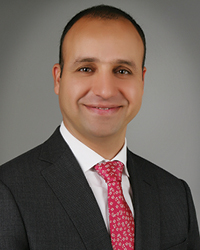When Ramadan Assi 07MPH took a post in early 2013 as the country director in Turkey for International Medical Corps, he was charged with fostering a program to support Iraqi and Afghan refugees in the northern part of the country. There were also a few hundred thousand Syrian refugees clustered along the Turkey-Syrian border, but their numbers didn't warrant a lot of his attention.
Today Assi finds himself smack in the middle of the largest refugee crisis since World War II. Some 2.5 million Syrians have surged into Turkey to escape the bloody war at home, and more stream across the border every day.
International Medical Corps, under Assi's leadership, has rapidly expanded its health care programs and support for the most vulnerable populations, including women and children, to address not only the sheer numbers of people pouring in but also their particular needs. That means in addition to providing medical care and vocational training and connecting refugees to legal services and education, International Medical Corps is also helping address the mental health needs of this traumatized population.

"The Syrian disaster is unique in its complexity and tragedy. All the refugees have been through untold suffering."
Ramadan Assi 07MPH
"The Syrian disaster is unique in its complexity and tragedy," says Assi. "All of the refugees have been through untold suffering. Unless they meet with trained psychologists, many of these people will never be at peace with themselves."
He tells of an exhausted, emaciated family of five he saw teetering on the steps to an International Medical Corps multiservice center in Gaziantep. The young family had lived in a besieged displaced persons camp near Damascus for three years before paying smugglers to get them first into southern Turkey and then to Istanbul. They had little more than the clothes on their backs when they finally made their way to Gaziantep.
Despite the agony of leaving his home and his life, of watching his wife and children go hungry, and of facing an uncertain future, the burden that most haunted the man was the guilt of having to leave his disabled mother behind in Syria. "It was very clear looking into his watery eyes that this man was broken," says Assi.
While making sure the refugees' immediate needs are met, Assi never takes his eyes off the long-term goal, which is restoring self-reliance. International Medical Corps runs seven multi-service centers within Turkey, serving tens of thousands of refugees. Syrian refugees can go there to access medical care, take classes to learn new skills, or just socialize with other refugees. Thousands of refugees have taken courses to learn Turkish, English, and Arabic in the hopes of being able to find a job. Women take classes in knitting, sewing, hair styling, and the like.
Assi tells of a young woman who fled Aleppo with her husband and six-month-old baby in April 2014. She has learned to speak Turkish and is training to become a hair stylist at the Gaziantep center. She's hopeful that, with her newfound skills, she'll be able to get a job and help her husband support their baby.
For Assi, a father of three, the hardest part of the job is dealing with the children. He remembers 11-year-old Abdulla, who had to leave school to work as a server in a restaurant to support his disabled father, his mother, and young brother and sister. He confided that he used to be the best in his class and that he missed school terribly before he collapsed crying.
More than 80% of the Syrian refugee children do not attend school, many because they need to work. "Abdulla is not an individual story," says Assi. "He spoke on behalf of hundreds of thousands of Syrian kids. This has been going on for five years now, and it's creating a lost generation. This is the future of Syria."
Assi's background makes him particularly empathetic to the refugees. He grew up in a farming family in Israeli-occupied territory in Palestine. "I had a rather harsh childhood," says Assi. "Going to school in a system that was administered by a foreign occupation army and growing up under military occupation was a struggle. I never felt at home in my own land. I know this experience has led me to the work I do now."
After a brief stint in banking, Assi discovered public health while working with CARE International in Palestine. He never looked back. In his 20s, he became the operation manager with CARE for Darfur Emergency Response Operations during the crisis. "I was heading an operation where we were feeding a half million refugees spread over a space the size of Texas every month," he says. "That year changed everything about me and how I think about life."
Assi came to Rollins School of Public Health straight from Darfur on a USAID presidential scholarhship. "I went from managing one of most complicated projects on earth at that time to studying statistics and taking exams," he says. "At Rollins, I was able to be enrolled in an elite program in global health leadership, and I earned a graduate certificate in human rights from the university."
Assi went on to a career that included posts with Qatar Charity, World Health Organization, International Medical Corps, and CARE International. He has lived and worked in many of the world's most complex humanitarian emergency settings, including Haiti, Jordan, Lebanon, Palestine, Somalia, Sudan, and Yemen.
Despite everything he's seen, he never forgets the reason he's there. "These refugees are just normal families," says Assi. "They are not an invading army. They are people who want the best for their families, for their children. They are just like you and me."

